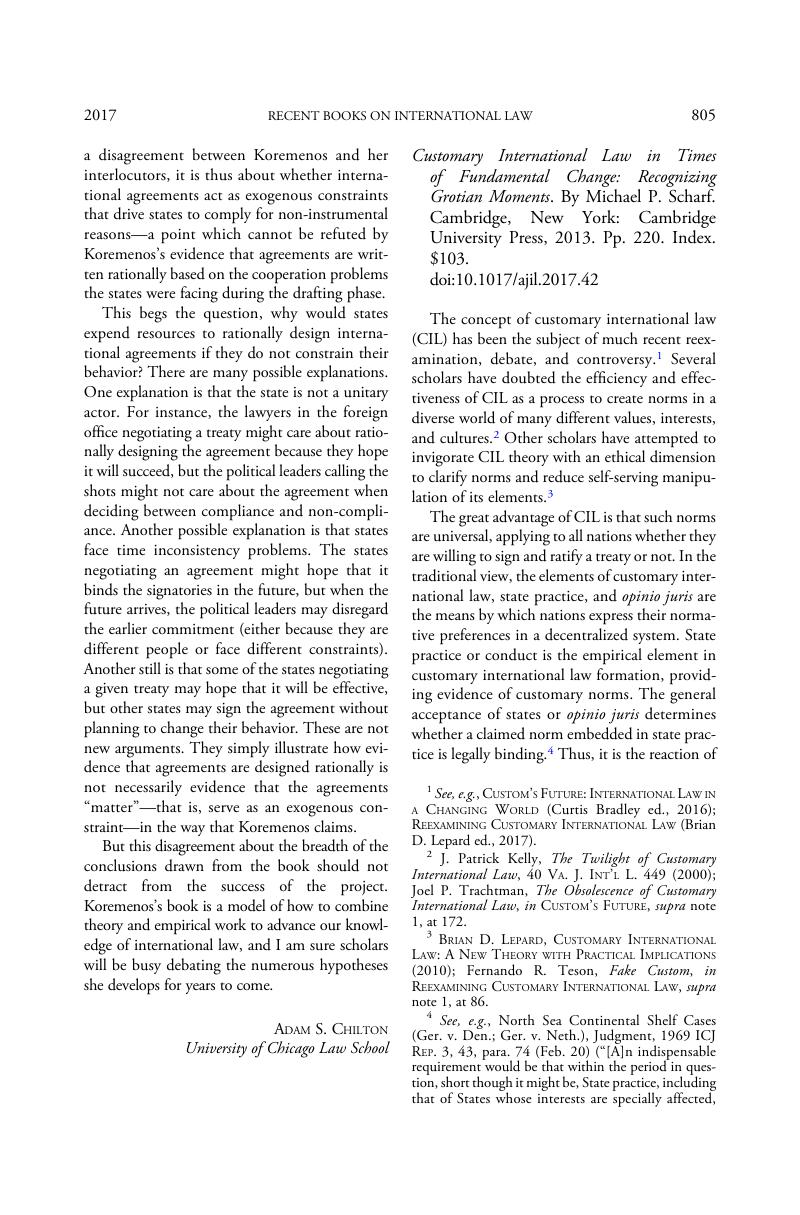No CrossRef data available.
Published online by Cambridge University Press: 13 September 2017

1 See, e.g., Custom's Future: International Law in a Changing World (Curtis Bradley ed., 2016); Reexamining Customary International Law (Brian D. Lepard ed., 2017).
2 Kelly, J. Patrick, The Twilight of Customary International Law , 40 Va. J. Int'l L. 449 (2000)Google Scholar; Joel P. Trachtman, The Obsolescence of Customary International Law, in Custom's Future, supra note 1, at 172.
3 Brian D. Lepard, Customary International Law: A New Theory with Practical Implications (2010); Fernando R. Teson, Fake Custom, in Reexamining Customary International Law, supra note 1, at 86.
4 See, e.g., North Sea Continental Shelf Cases (Ger. v. Den.; Ger. v. Neth.), Judgment, 1969 ICJ Rep. 3, 43, para. 74 (Feb. 20) (“[A]n indispensable requirement would be that within the period in question, short though it might be, State practice, including that of States whose interests are specially affected, should have been both extensive and virtually uniform in the sense of the provision invoked; and should moreover have occurred in such a way as to show a general recognition that a rule of law or legal obligation is involved.”) (emphasis added).
5 See Delimitation of the Maritime Boundary in the Gulf of Maine Area (Can. v. U.S.), Judgment, 1984 ICJ Rep. 246, 299, para. 111 (Oct. 12); see also Lepard, supra note 3, at 105–07. For a contrary view, see Anthony A. D'Amato, The Concept of Custom in International Law (1971).
6 See Military and Paramilitary Activities in and Against Nicaragua (Nicar. v. U.S.), Merits, Judgment, 1986 ICJ Rep. 14, 108–09, para. 207 (June 27) (“[A]s was observed in the North Sea Continental Shelf cases, for a new customary rule to be formed, not only must the acts concerned ‘amount to a settled practice’ but they must be accompanied by the opinio juris sive necessitatis. Either the States taking such action or other States in a position to react to it, must have behaved so that their conduct is ‘evidence of a belief that this practice is rendered obligatory by the existence of a rule of law requiring it. The need for such a belief, i.e. the existence of a subjective element, is implicit in the very notion of opinio juris sive necessitatis.’”).
7 The Grotian Moments reference is an homage to Hugo Grotius, considered the founder of modern international law, who developed a new conception of international law based on a community of secular states operating under binding legal rules (pp. 3–6).
8 Kirgis, Frederic L., , Jr., Custom on a Sliding Scale , 81 AJIL 146, 149 (1987)CrossRefGoogle Scholar.
9 Id. at 149.
10 Affirmation of the Principles of International Law Recognized by the Charter of the Nuremberg Tribunal, GA Res. 95 (I), UN GAOR, 1st Sess., pt. 2, at 1144, UN Doc A/236 (Dec. 11, 1946).
11 See, e.g., Attorney General of Israel v. Eichmann, 36 I.L.E. 277 (Isr. Sup. Ct. 1962).
12 The U.S. State Department legal memorandum described a series of legal and policy bases for this position. Ann L. Hollick, U.S. Foreign Policy and the Law of the Sea 45–46 (1981).
13 Prosecutor v. Tadić, Case No. IT-94-1-AR72, Decision on the Defense Motion for Interlocutory Appeal on Jurisdiction, para. 87 (Int'l Crim. Trib. for the Former Yugoslavia Oct. 2, 1995).
14 Hamden v. Rumsfeld, 126 S.Ct. 2749, 2796, n. 63 (2006).
15 Teson, Fernando R., Kosovo: A Powerful Precedent for the Doctrine of Humanitarian Intervention , 1 Amsterdam L. Forum 4 (2009)Google Scholar.
16 See Legal Consequences of the Construction of a Wall in the Occupied Palestinian Territory, Advisory Opinion, 2004 ICJ Rep. 136 (July 9); Armed Activities on the Territory of the Congo (Dem. Rep. Congo v. Uganda), 2005 ICJ Rep. 168 (Dec. 19).
17 See Professor Scharf's discussion of the separate opinions of Judge Higgins in the Wall case and of Judges Koojimans and Simma in the Congo case at pages 209–10.